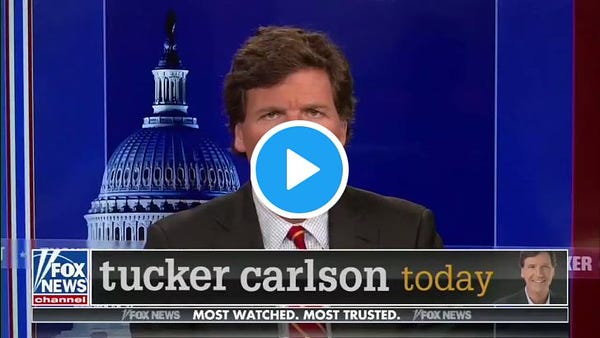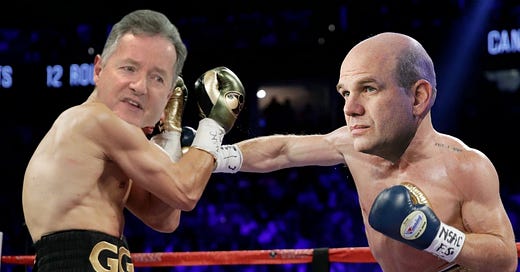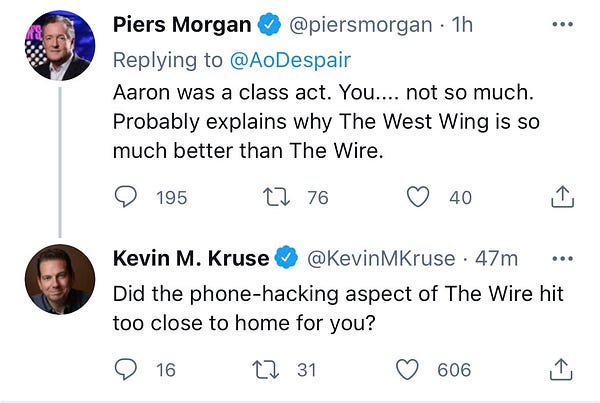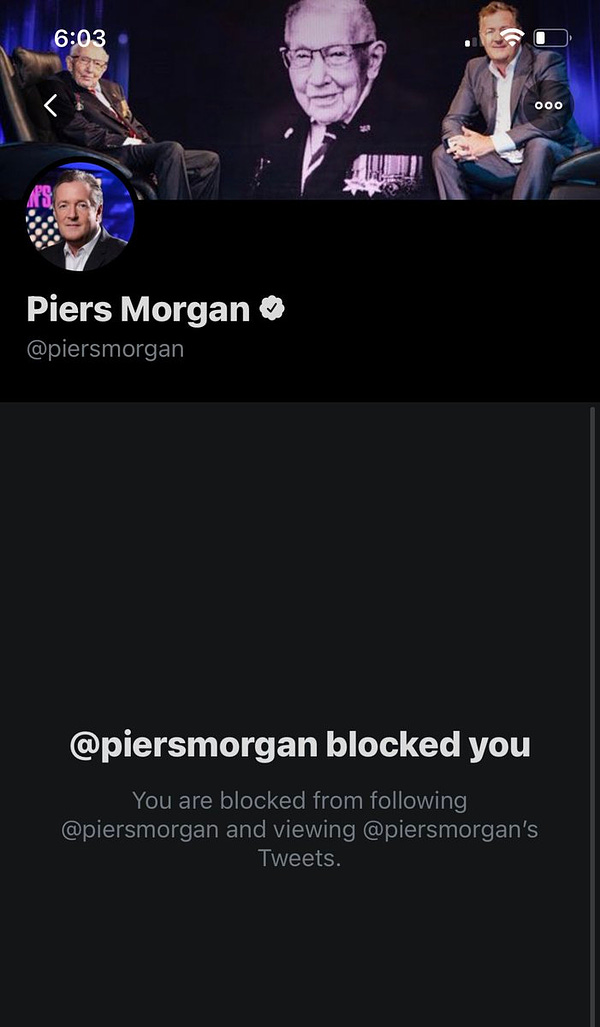David Simon vs. Piers Morgan: A study in comparing real success and vanity metrics
The creator of The Wire will leave a legacy. Piers Morgan will leave a grease stain.
A Twitter argument between David Simon, the genius co-creator of The Wire, and Piers Morgan, uh… who’s Piers Morgan, provided an interesting lesson in the difference between measurements of substance and junk metrics.


Before he became a TV writer, Simon was a police reporter at The Baltimore Sun. He joined the paper aged 22 and was inspired to become a journalist by The Washington Post’s investigations into Watergate. An ex-colleague, quoted in a 1999 Seattle Times piece, said, “David buys into journalism completely. He thinks it’s God’s work.”
In the same article, Simon explained his thinking:
I grew up reading the Post when they were chasing Nixon. I thought journalism was, ‘You write, you expose, you change the terrain’… now, all I want is to bring the best story to the campfire. To make it something people want to hear and not to cheat it.
If Simon is about ‘God’s work’ and a desire ‘not to cheat it’, Piers Morgan has been sculling around with the devil since the start of his career as a journalist and big mouth for hire.


After leaving school and spending nine months working for Lloyd’s of London as an insurance clerk, Morgan went to Harlow College1 to study journalism before taking a job with the Surrey and South London Newspaper Group. But his career really began when he started freelancing for The Sun in 1988.
He was quickly recruited onto The Sun’s staff to work on the showbiz column Bizarre and was soon the column’s main writer and editor. In one of his occasional bursts of self-awareness, he told Hunter Davies in December 1994 — at the end of his first year as editor of the News of the World — that self-publicising had been his key strategy on Bizarre:
I became the Friend of the Stars, a rampant egomaniac, pictured all the time with famous people - Madonna, Stallone, Bowie, Paul McCartney, hundreds of them. It was shameless, as they didn't know me from Adam
…I got a letter one day from someone on HMS Campbeltown, saying I was appalling. Everyone on board got in a rage when they saw my face - so I printed that letter in full, in the column.
That tactic — proudly being a prick — has continued to serve Morgan well as he moved from The Sun to The News of the World to The Mirror, where his tabloid career came to a terminal conclusion.







At The Mirror, Morgan had to apologise for the headline Achtung Surrender! For You, Fritz Ze Euro Championship Is Over on 25 June 1996, the day before England met Germany in the semi-final of Euro 96 (Germany won on penalties), and, in 2000, was ‘lucky’ to survive the ‘City Slickers scandal’ in which he breached the Press Complaints Commission’s code of conduct on financial journalism by buying shares tipped by his paper’s columnists.
Morgan was cleared of any charges by a Department of Trade and Industry enquiry in 2004. But the following year, at the trial of Anil Bhoyrul and James Hipwell, the Mirror City Slickers columnists who lost their jobs and were convicted of conspiracy to breach the Financial Services Act, it was revealed that Morgan had purchased £67,000 worth of Viglen shares, emptying his bank account and also investing in his then-wife’s name too.
Morgan’s luck as Mirror editor ran out on May 14 2004 when he was sacked with immediate effect. He got the boot after refusing to apologise to Sly Bailey, boss of The Mirror’s then-owners Trinity Mirror, for publishing photos that claimed to show soldiers from the Queens Lancashire Regiment abusing prisoners in Iraq. They were shown to be fakes.
While The Mirror responded with the headline Sorry… we were hoaxed, Morgan refused to admit the photographs were faked. He rightly stated that abuse similar to that shown in the photographs was being perpetrated by British Army troops in Iraq at the time, while seemingly failing to understand that printing faked images was indefensible.
And that’s before we even get into the question of phone hacking, which Morgan denies any knowledge of, despite frequent occurrences of it at both News UK and Trinity Mirror — which both companies continue to pay out settlements for — and Morgan boasting of his knowledge of how to do it in his first volume of diaries, The Insider.
Also in that book, Morgan’s entry about the day he was fired from The Mirror is a series of dropped names (“…the mobile went and it was Ian Botham…”, “First call after it became public was from Mohammad Al Fayed…”, “Then Marco Pierre White, another foul weather friend…”, “A letter dropped through the door from Fiona Bruce…”)
Morgan’s subsequent diary entries reveal just how delighted he was to be the centre of attention; it’s a delight that has not left him since then. He’d began a TV career before his Mirror defenestration — a documentary on fame for the BBC and three series of a current affairs interview show with fellow fulminating egotist Amanda Platell for Channel 4 — but it was the patronage of Simon Cowell that propelled him to a new level of fame.
In 2006, Cowell chose Morgan to be the ‘bad guy’ of the America’s Got Talent panel when his own contract with America Idol prevented him from taking on the role. Morgan continued in that job for the second season as well as keeping his seat for the British version. By 2008, he’d secured a £2 million deal with ITV to continue on Britain’s Got Talent for two more series, produce his own interview series, and develop documentaries. Piers Morgan’s Life Stories began in 2009.
That higher profile also got him the gig at CNN where he was announced as the replacement for Larry King in September 2010. He presented Piers Morgan Live from January 2011 until March 2014, when the network axed the show citing poor ratings. Morgan admitted to The New York Times — in another rare outbreak of self-awareness — that he’d pissed off the audience:
It’s been a painful period and lately, we have taken a bath in the ratings… I [was] a British guy debating American cultural issues, including guns, which has been very polarising, and there is no doubt that there are many in the audience who are tired of me banging on about it.
That brings me back to David Simon. He became disillusioned with the Baltimore Sun after new owners pushed through benefits cuts; he fought them as union captain during the subsequent strike. Talking to The Baltimore City Paper in 2008, he said: “I got out of journalism because some sons of bitches bought my newspaper and it stopped being fun."
A year’s leave of absence from the paper, which he spent embedded with the Baltimore Police Department’s Homicide Unit, led to him producing the award-winning book Homicide: A Year on the Killing Streets. In 1993, that became the TV series Homicide: Life on the Street, which ran for 6 years. Simon worked as a writer on the show but only left his job at The Baltimore Sun to commit full-time to it full time in 1995.
Two years later, he co-authored The Corner: A Year in the Life of an Inner-City Neighbourhood, with veteran Baltimore homicide cop, Ed Burns. That book, in turn, became the HBO miniseries The Corner, presaging Simon and Burns’ more famous collaboration — the critically lauded, multi-award-winning series The Wire, which premiered in June 2002 and ran until 2008, producing 60 episodes.
Simon has gone on to write and produce five more successful series with HBO — Generation Kill (with Burns), Treme (with Eric Overmyer), Show Me a Hero, The Deuce, and The Plot Against America (again with Burns).
Comparing their CVs is enough to show that Piers Morgan coming for David Simon is like a kid with a bb-gun trying to take down an Abrams tank. Where Simon’s journalistic career was about breaking tough stories in a tough city, Morgan’s was built on sucking up to the bosses, sidling up to celebrities, and putting himself in the frame.


But the most telling part of their Twitter clash is that while Simon can point to 25 years of working with HBO’s parent company Time Warner, Piers Morgan has to point to the size of his… Twitter following. And there’s the comparison between measurements of substance and empty metrics.
While David Simon’s body of work will be studied for decades to come, Piers Morgan is a transient controversialist, forced to boast about how many people monitor his daily Twitter tantrums and dance on his hind legs for Tucker Carlson on Fox News. Another American show is no doubt in Morgan’s future — he’s made a career out of failing upwards — but it will never fill the howling void inside him or lead to anything vaguely resembling a legacy.
The other famous alumnus of Harlow College? Kelvin Mackenzie.






